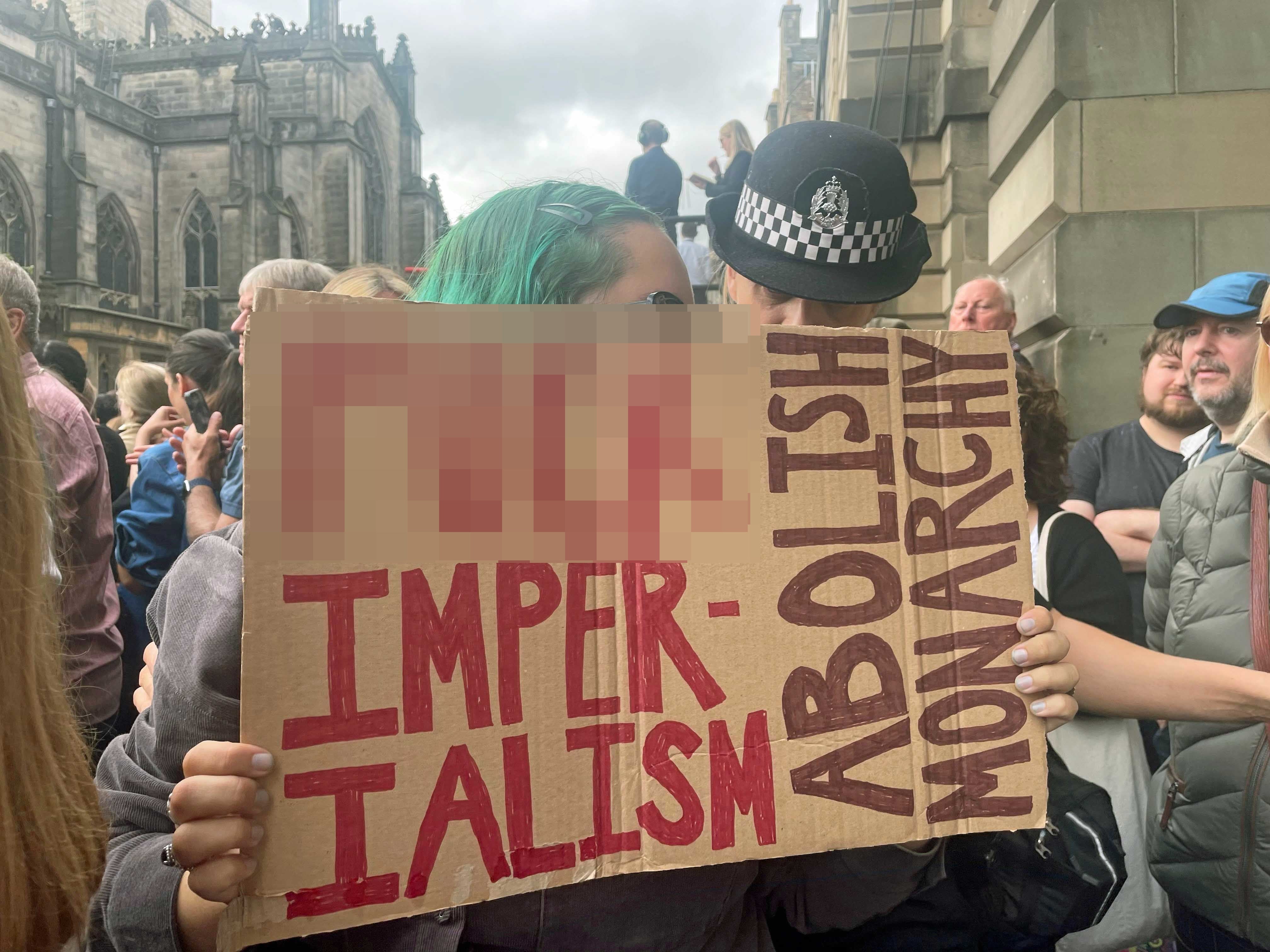Seeing Brits arrested for protesting against the monarchy makes me glad I’m American
We have a very different culture of free speech here than in the UK, where hate speech and libel laws are much more aggressive – so much so that, to my mind, they are unforgivably draconian


Your support helps us to tell the story
From reproductive rights to climate change to Big Tech, The Independent is on the ground when the story is developing. Whether it's investigating the financials of Elon Musk's pro-Trump PAC or producing our latest documentary, 'The A Word', which shines a light on the American women fighting for reproductive rights, we know how important it is to parse out the facts from the messaging.
At such a critical moment in US history, we need reporters on the ground. Your donation allows us to keep sending journalists to speak to both sides of the story.
The Independent is trusted by Americans across the entire political spectrum. And unlike many other quality news outlets, we choose not to lock Americans out of our reporting and analysis with paywalls. We believe quality journalism should be available to everyone, paid for by those who can afford it.
Your support makes all the difference.The wonderful thing about free speech is it fosters public discourse and debate. That is certainly true of my piece from last Friday, in which I critiqued Dr Uju Anya’s tweet about the late Queen. The college professor wrote that she wished the Queen pain in death, which caused huge consternation online.
“The Queen is dead,” one commenter wrote, in response to my article, “but the right of people to express their opinions isn’t.”
Hear, hear. Whether it surprises you or not, I agree with that sentiment. As an opinion journalist, I firmly believe in what we Americans call “First Amendment freedoms” – that is, the right to free speech and expression as well as the right to a free and independent press. I am privileged to frequently share my opinions with the public, and I do not take that freedom lightly.
Which is why I am appalled that, on Sunday, at least two people were arrested for protesting against the monarchy during proclamation ceremonies for now-King Charles. The first, a 22-year-old woman, was arrested in Edinburgh for breach of the peace. She was holding a sign that read “F*** imperialism, abolish the monarchy,” though “the sign is not understood to be the reason for her arrest,” the Independent previously reported.
In Oxford, 45-year-old Symon Hill was arrested under the Public Order Act for causing “harassment, alarm, or distress.” Hill — who shouted about not supporting the monarchy — claims he remained quiet for the portion of the proclamation concerning the death of the late Queen, and that he doubts “most of the people in the crowd even heard me” when he did speak.
The Politics Home editor Alan White – who witnessed the incident – said that possible harassment, alarm, or distress “were not born out of what I witnessed.” Some in the crowd told Hill to shut up, which was their right. People are, or ought to be at any rate, free to protest. But that does not mean others are not free to respond to their protest or other speech.
Indeed, that is what I was doing in responding to Dr Anya’s tweet. I disagreed with her, and I believe she is factually wrong. In a free and democratic society, this is exactly how things should be: Someone says something, someone else disagrees and respectfully explains why. This is how progress happens, by debating even charged and emotive topics in a deliberate and constructive manner.
I am an American. We have a very different culture of free speech here than in the UK, where hate speech and libel laws are much more aggressive – so much so that, to my mind, they are unforgivably draconian.
In 2009, as a budding student journalist, I wrote a blog about a Norwich grandmother who was visited by the police after complaining to her local council about a gay rights parade near her home. She was upset about the “perverted sexual practices” of “sodomites,” which she claimed were responsible for “the downfall of every empire.”
“I admit,” I wrote at the time, “if I saw Mrs Howe, I would tell her exactly what I think about her opinion and where she can put that Bible. Because that’s my right, the same as it is Mrs Howe’s right to express her odious views. Freedom of speech doesn’t just protect those you agree with. More importantly, it protects the rights of those you disagree with.”
As a gay man, I find Howe’s comments and opinions bigoted and repugnant. As a small-d democrat, however, I find the fact the police investigated her even more offensive. “Any society which begins to legislate thoughts and feelings – no matter how disgusting – is a society dangerously on the verge of losing its liberties,” I wrote at the time.
A lot has happened in the ensuing 13 years. Strict hate speech laws in the UK have led to fierce public debates about what should and should not be a criminal offense. In 2010, a Christian preacher was arrested for preaching against homosexuality outside a shop in Workington. Charges were, however, eventually dropped. Last year, Scottish gender-critical feminist Marion Millar, from Airdrie, was charged for allegedly tweeting homophobic and transphobic comments. Again, the case was eventually dropped.
Still, the damage was done. Both cases have had a chilling effect on free speech. Whether one agrees with either of these people is beside the point. One cannot claim they are a supporter of free speech and expression while also wishing that those who disagree with them are arrested and prosecuted for thought crimes. It is literally Orwellian.
All of this brings me back to the events of yesterday. The young woman in Scotland’s sign was in poor taste. I do not like signs with swear words on them, personally. I drove past one such sign, proclaiming “F*** Joe Biden,” for months in my home town. It sat close to a church playground, and all I could think is that children would see that sign. Though I disagreed with the sentiment and the swearing, however, it never occurred to me to call the police. That person has a right to express their opinion, however crassly they chose to do so.
Likewise, people have a right to campaign for the abolition of the monarchy. At least, they must if Britain continues to claim to be a liberal democracy. You do not have to agree with their beliefs, of course, but to be anything other than an authoritarian you must support their right to express such beliefs. That is what makes liberal democracy so special and so different to the repressive regimes in Russia, China, and elsewhere.
The police have no business policing thought or speech. You cannot, or rather should not, legislate against hate or against republicanism because both are thoughts and feelings – not actions. In a free and democratic society, thoughts and feelings ought to be allowed expression, not prosecution.
So too should we understand exactly what free speech entails. Freedom of speech protects your right to your opinion. It does not shield you from criticism or rebuttal. I had every right to respond to Dr Anya’s comments, but it would not have been right for me to insist she be arrested for them. Similarly, the people who told Symon Hill to “shut up” were well within their rights. It is the police who crossed the line.
No one should be arrested for an unpopular view, regardless of whether they’re a homophobe or a republican. As the nation swears allegiance – or not – to its new sovereign, may the British people and government also renew their commitment to free speech and expression. We can only do that if we commit to protecting the rights of those with whom we profoundly disagree.
Join our commenting forum
Join thought-provoking conversations, follow other Independent readers and see their replies
Comments